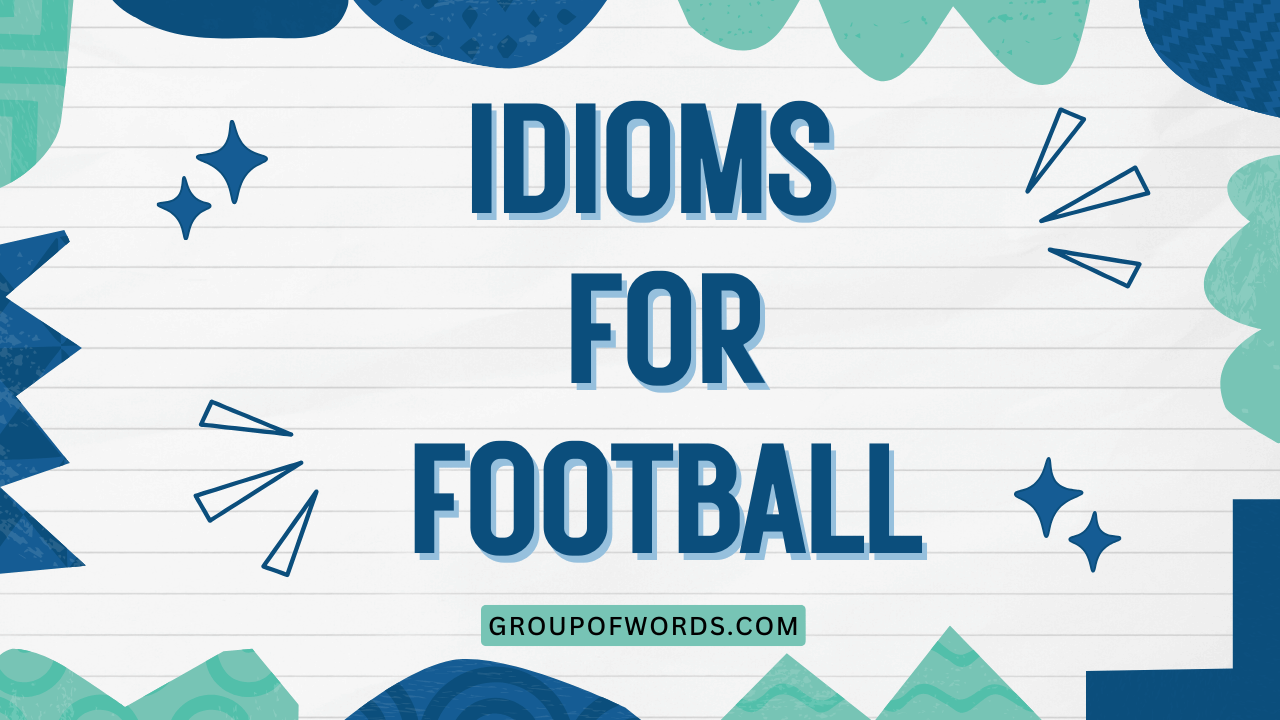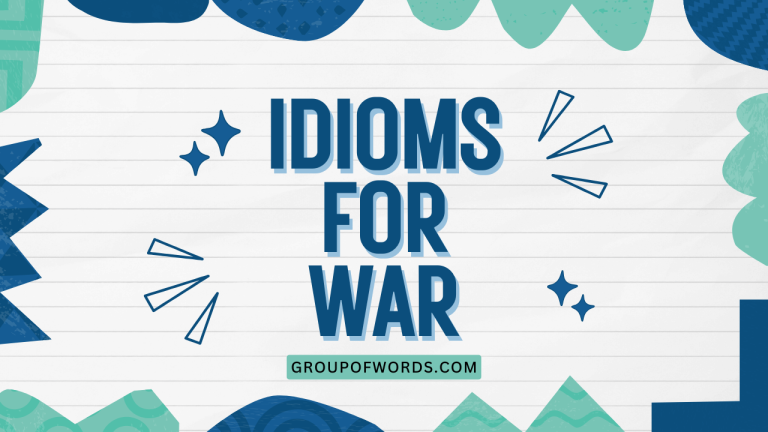Football Idioms: Mastering English Through the Beautiful Game
Football, or soccer as it’s known in some parts of the world, is more than just a sport; it’s a cultural phenomenon. Its influence extends beyond the pitch, permeating everyday language with colorful and expressive idioms.
Understanding these idioms is crucial for anyone looking to improve their English comprehension, especially when engaging in conversations about sports, business, or even personal life. This article provides a comprehensive guide to football idioms, exploring their meanings, origins, and usage, helping you to speak and understand English more fluently and confidently.
Whether you’re a seasoned football fan or a language learner, this guide will equip you with the knowledge to navigate the world of football idioms like a pro.
This guide is designed for English language learners, football enthusiasts, and anyone interested in expanding their vocabulary and understanding of idiomatic expressions. By the end of this article, you’ll be able to recognize, understand, and use football idioms in various contexts, enhancing your communication skills and cultural awareness.
Table of Contents
- Introduction
- Definition of Football Idioms
- Structural Breakdown
- Types and Categories of Football Idioms
- Examples of Football Idioms
- Usage Rules for Football Idioms
- Common Mistakes with Football Idioms
- Practice Exercises
- Advanced Topics
- Frequently Asked Questions
- Conclusion
Definition of Football Idioms
Football idioms are expressions that use terms and concepts from the sport of football to convey meanings beyond their literal definitions. These idioms often describe situations, actions, or qualities that are analogous to those found in a football game.
They add color and nuance to language, allowing speakers to express themselves in a vivid and relatable way. Understanding these idioms is essential for comprehending informal English and appreciating the cultural significance of football.
Idioms, by their nature, are figurative rather than literal. This means that the individual words in the idiom do not directly translate to the overall meaning. For example, “to move the goalposts” doesn’t literally mean to physically move the football goal; it means to change the rules or objectives of a situation unfairly. The effectiveness of idioms lies in their ability to evoke a shared understanding or experience, in this case, the common knowledge of football.
Football idioms can be classified based on their function and the context in which they are used. Some describe attacking strategies, while others relate to defensive tactics or overall game management.
Additionally, some idioms have broader applications, extending beyond the realm of sports to describe everyday situations. Recognizing these classifications can help learners understand and use idioms more effectively.
Structural Breakdown
The structure of football idioms varies depending on the specific expression. Some idioms are phrases consisting of a verb and a noun, such as “to score an own goal.” Others are complete sentences that convey a particular meaning, like “it’s a whole new ball game.” Understanding the structural elements of these idioms can aid in their comprehension and application.
Many football idioms involve metaphorical language, comparing real-life situations to events on the football field. For instance, “to be on the ball” implies being alert, competent, and proactive, drawing a parallel to a player who is skilled at controlling the ball.
The use of metaphors allows idioms to convey complex ideas concisely and memorably.
The grammatical structure of an idiom itself doesn’t always conform to standard grammatical rules when taken literally. The meaning is derived from the established usage of the phrase as a whole.
Therefore, it is crucial to learn idioms as complete units rather than trying to analyze their individual components.
Types and Categories of Football Idioms
Football idioms can be categorized based on various factors, including their association with specific aspects of the game and their general applicability to different contexts. Here are some common categories:
Attacking Idioms
These idioms relate to offensive strategies and actions aimed at scoring goals. They often describe aggressive or proactive approaches in various situations.
Defensive Idioms
Defensive idioms focus on protecting one’s position or preventing unfavorable outcomes. They highlight strategies for resisting pressure and maintaining stability.
Game-Related Idioms
These idioms are directly linked to the rules, events, and overall dynamics of a football match. They capture the essence of the sport and its unique characteristics.
General Football Idioms
General football idioms have broader applications and can be used to describe a wide range of situations beyond the football field. They often convey universal concepts such as teamwork, competition, and success.
Idioms Describing Player Performance
These idioms are used to describe how well a player performs, their skills, and their contribution to the team. They can be positive or negative, depending on the context.
Examples of Football Idioms
This section provides a comprehensive list of football idioms, categorized by their primary association with different aspects of the game. Each idiom is accompanied by a definition and example sentences to illustrate its usage.
Attacking Idioms
Attacking idioms often relate to scoring, taking advantage of opportunities, and pressing forward. The table below offers a wide range of examples.
| Idiom | Definition | Example Sentence |
|---|---|---|
| To score an own goal | To unintentionally harm one’s own interests. | By revealing the company’s secrets, he scored an own goal in the negotiations. |
| To be on the attack | To be aggressive and assertive in pursuing a goal. | The lawyer was on the attack, aggressively questioning the witness. |
| To take a shot at something | To attempt something, often with a low chance of success. | I decided to take a shot at getting the promotion, even though I knew it was a long shot. |
| To go for goal | To make a determined effort to achieve a specific objective. | With only a few weeks left, the team decided to go for goal and launch the new product. |
| To have a good strike rate | To have a high success rate. | The sales team has a good strike rate, closing deals with almost every client they meet. |
| To be a game changer | Someone or something that dramatically alters the situation. | The new technology was a game changer for the industry. |
| To move the goalposts | To change the rules or objectives of a situation unfairly. | Every time we meet his demands, he moves the goalposts. |
| To get a shot on goal | To have an opportunity to achieve something. | We finally got a shot on goal when the competitor went bankrupt. |
| To be in the lead | To be ahead of others in a competition or race. | Our company is in the lead in terms of market share. |
| To take the lead | To assume a position of dominance or control. | She decided to take the lead in the project and guide the team to success. |
| To be a front runner | To be the leading contender in a competition. | He is considered a front runner in the election. |
| To be pushing forward | To actively advance towards a goal. | The company is pushing forward with its expansion plans. |
| To be on the offensive | To be aggressive and proactive in pursuing a goal. | The marketing team is on the offensive, launching several new campaigns. |
| To play a blinder | To perform exceptionally well. | He played a blinder in the presentation, impressing everyone. |
| To get the ball rolling | To start something. | Let’s get the ball rolling on this project. |
| To kick something into touch | To reject or abandon an idea or plan. | The committee decided to kick the proposal into touch. |
| To score a victory | To achieve a win or success. | The company scored a major victory by securing the contract. |
| To clinch the deal | To finalize or secure a deal or agreement. | He managed to clinch the deal at the last minute. |
| To gain ground | To make progress or advance. | The company is gaining ground in the market. |
| To press home an advantage | To exploit an advantage to achieve a greater outcome. | The team needs to press home their advantage to win the game. |
| To capitalize on an opportunity | To take advantage of a chance to achieve success. | The company capitalized on the opportunity to expand its market share. |
| To make a breakthrough | To achieve a significant advance or discovery. | The scientists made a breakthrough in their research. |
| To be in a strong position | To be in a favorable or advantageous situation. | The company is in a strong position to negotiate the terms. |
Defensive Idioms
Defensive idioms often involve protecting oneself or one’s interests. They are used when dealing with challenges or opposition.
| Idiom | Definition | Example Sentence |
|---|---|---|
| To defend one’s position | To protect or maintain one’s stance or argument. | He had to defend his position against strong criticism. |
| To play defensively | To act cautiously and avoid taking risks. | The company is playing defensively due to the uncertain economic climate. |
| To be caught offside | To be in an unfavorable position or caught doing something wrong. | The politician was caught offside when the scandal was revealed. |
| To be on the back foot | To be in a defensive or reactive position. | The team was on the back foot after the opponent scored an early goal. |
| To hold the line | To maintain a position or resist pressure. | The employees worked hard to hold the line during the crisis. |
| To take one for the team | To make a sacrifice for the benefit of a group. | He took one for the team by accepting the blame for the mistake. |
| To cover all the bases | To take all necessary precautions. | We need to cover all the bases to ensure the project’s success. |
| To play for time | To delay or stall in order to gain an advantage. | The negotiator was playing for time to allow the team to gather more information. |
| To be a safe pair of hands | To be reliable and trustworthy. | She is a safe pair of hands when it comes to managing the company’s finances. |
| To keep one’s eye on the ball | To stay focused and attentive to the task at hand. | It’s important to keep your eye on the ball during the negotiations. |
| To mark someone closely | To pay close attention to someone’s actions. | The detective was marking the suspect closely. |
| To batten down the hatches | To prepare for a difficult situation. | The company is battening down the hatches in anticipation of the economic downturn. |
| To circle the wagons | To come together to defend against attack. | The team circled the wagons when their project came under criticism. |
| To play it safe | To avoid risks. | He decided to play it safe and invest in government bonds. |
| To protect your turf | To defend your position or area of responsibility. | The manager was determined to protect his turf from the new executive. |
| To shore up defenses | To strengthen one’s protection or defenses. | The company needed to shore up its defenses against the cyber attacks. |
| To stand your ground | To refuse to back down. | She decided to stand her ground and fight for her rights. |
| To weather the storm | To survive a difficult period. | The company managed to weather the storm of the financial crisis. |
| To build a wall | To create a barrier to prevent something from happening. | They tried to build a wall against the negative publicity. |
| To block a move | To prevent someone from succeeding. | The government blocked the company’s move to merge with its competitor. |
| To deflect criticism | To avoid or redirect criticism. | The politician tried to deflect criticism by blaming his staff. |
| To dodge a bullet | To narrowly avoid a disaster. | The company dodged a bullet when the lawsuit was dismissed. |
Game-Related Idioms
These idioms are closely tied to the rules, events, and dynamics of a football game. They often convey concepts such as teamwork, competition, and strategy.
| Idiom | Definition | Example Sentence |
|---|---|---|
| It’s a whole new ball game | The situation has completely changed. | With the new management team in place, it’s a whole new ball game. |
| To be neck and neck | To be in a very close competition. | The two candidates are neck and neck in the polls. |
| To be a one-man team | Someone who does everything themselves and doesn’t rely on others. | He’s such a one-man team, he never delegates tasks to anyone. |
| To be down to the wire | To be decided at the last moment. | The negotiations went down to the wire before they reached an agreement. |
| To get a yellow card | To receive a warning or reprimand. | He got a yellow card from his boss for being late to the meeting. |
| To be sent off | To be dismissed or removed from a situation. | He was sent off the project for his poor performance. |
| To be onside | To be acting within the rules. | Make sure you’re onside with the regulations before proceeding. |
| To play the referee | To act as a mediator or judge in a dispute. | I had to play the referee between my two arguing colleagues. |
| To blow the whistle | To report wrongdoing or illegal activities. | He decided to blow the whistle on the company’s fraudulent practices. |
| To foul someone | To treat someone unfairly. | He fouled his colleague by taking credit for his work. |
| Extra time | Additional time to resolve an issue. | We need to put in some extra time to finish the project. |
| A level playing field | A situation where everyone has an equal opportunity. | We need to create a level playing field for all employees. |
| The ball is in your court | It’s your turn to take action. | I’ve done my part; now the ball is in your court. |
| A game of two halves | A situation that changes significantly over time. | The project was a game of two halves; it started poorly but ended successfully. |
| To kick off | To start something. | The conference will kick off with a keynote speech. |
| The final whistle | The end of something. | The project reached the final whistle after months of hard work. |
| To be ahead at halftime | To be in a good position at the midpoint of a process. | The company was ahead at halftime, but they needed to maintain their lead. |
| To be a team player | To work well with others. | She is a great team player and always helps her colleagues. |
| To be a good sport | To accept defeat gracefully. | He was a good sport even though he lost the competition. |
| To take the wind out of someone’s sails | To discourage or deflate someone. | His criticism took the wind out of my sails. |
| To pass the buck | To avoid responsibility by passing it on to someone else. | He tried to pass the buck, but the manager held him accountable. |
| To play ball | To cooperate or agree. | The company was willing to play ball and negotiate the terms. |
General Football Idioms
These idioms have broader applications and can be used in various contexts beyond football. They often convey universal concepts such as teamwork, competition, and success.
| Idiom | Definition | Example Sentence |
|---|---|---|
| To be on the ball | To be alert, competent, and proactive. | She’s really on the ball; she always anticipates problems and solves them quickly. |
| To drop the ball | To make a mistake or fail to fulfill a responsibility. | He dropped the ball by missing the deadline. |
| To get the ball rolling | To start something. | Let’s get the ball rolling on this project by holding a kickoff meeting. |
| Below the belt | Unfair or unethical. | His personal attacks were below the belt. |
| To keep your eye on the ball | To stay focused and attentive to the task at hand. | It’s important to keep your eye on the ball during the negotiations. |
| To be in the running | To have a chance of success. | She’s still in the running for the job. |
| Touch base | To make contact with someone. | Let’s touch base next week to discuss the project’s progress. |
| Out of your league | Beyond your capabilities or social status. | That job is out of your league; you don’t have the necessary experience. |
| To go the whole nine yards | To do everything possible to achieve a goal. | He went the whole nine yards to impress his boss. |
| To start from scratch | To begin something from the beginning. | After the fire, they had to start from scratch to rebuild their business. |
| A level playing field | A situation where everyone has an equal opportunity. | We need to create a level playing field for all employees. |
| To play hardball | To be aggressive and uncompromising. | The negotiator was playing hardball to get the best deal. |
| To be a front runner | To be the leading contender in a competition. | He is considered a front runner in the election. |
| To be a safe bet | To be a reliable choice. | Investing in real estate is usually a safe bet. |
| To drop back | To reduce effort or involvement. | He decided to drop back from the project due to other commitments. |
| To get a head start | To gain an early advantage. | She got a head start by studying the material in advance. |
| To have a long shot | To have a low probability of success. | Winning the lottery is a long shot. |
| To hold all the cards | To be in a position of power. | The company holds all the cards in the negotiation. |
| To jump the gun | To act prematurely. | He jumped the gun by announcing the deal before it was finalized. |
| To lose ground | To fall behind. | The company started to lose ground to its competitors. |
| To move upfield | To make progress. | The project is moving upfield as we complete each milestone. |
Idioms Describing Player Performance
These idioms are used to describe how well a player performs, their skills, and their contribution to the team. They can be positive or negative, depending on the context.
| Idiom | Definition | Example Sentence |
|---|---|---|
| To play a blinder | To perform exceptionally well. | He played a blinder in the final, scoring two goals. |
| To be a star player | To be a key or outstanding member of a team. | She is the star player of the basketball team. |
| To be a team player | To work well with others. | He is a great team player and always supports his colleagues. |
| To carry the team | To be primarily responsible for a team’s success. | She had to carry the team after several players got injured. |
| To be a one-man team | To do everything themselves and not rely on others. | He acts like a one-man team, never delegating tasks to anyone. |
| To warm the bench | To be a substitute player who rarely gets to play. | He spent most of the season warming the bench. |
| To be on top form | To be performing at one’s best. | She was on top form during the competition. |
| To be out of form | To be performing below one’s usual standard. | He has been out of form lately and needs to improve his performance. |
| To be a seasoned player | To be experienced and skilled. | He is a seasoned player with years of experience in the industry. |
| To be a rising star | To be a promising and talented newcomer. | She is a rising star in the company. |
| To be a key player | To be a crucial member of a team. | He is a key player in our success. |
| To be a utility player | To be versatile and able to perform many roles. | She is a utility player and can handle various tasks. |
| To be a game-changer | To be someone who dramatically alters the situation. | His innovative ideas made him a game-changer. |
| To be a natural | To have an innate talent or ability. | She is a natural at playing the piano. |
| To be a slow starter | To take time to get going or perform well. | He is a slow starter but eventually becomes a top performer. |
| To be a consistent performer | To perform reliably and steadily. | She is a consistent performer who always delivers results. |
| To be a big hitter | To be a powerful and influential person. | He is a big hitter in the industry. |
| To be a valuable asset | To be a beneficial and important resource. | She is a valuable asset to the company. |
Usage Rules for Football Idioms
Using football idioms correctly requires an understanding of their specific meanings and contexts. While idioms add flair to language, misusing them can lead to confusion or miscommunication.
Here are some key rules to follow:
- Learn the Meaning: Always ensure you understand the precise meaning of an idiom before using it. Refer to reliable sources such as dictionaries or idiom guides.
- Consider the Context: Use idioms in appropriate contexts. Some idioms are suitable for informal conversations, while others may be appropriate in professional settings.
- Avoid Overuse: While idioms can enhance communication, overuse can make your speech sound unnatural or contrived. Use them sparingly and purposefully.
- Pay Attention to Grammar: While idioms are often fixed phrases, their grammatical structure may need to be adjusted to fit the sentence. For example, “to be on the ball” can be conjugated as “he is on the ball” or “they were on the ball.”
- Be Aware of Regional Variations: Some football idioms may be more common in certain regions or countries than others. Be mindful of your audience and adapt your language accordingly.
It’s also important to remember that idioms are not always directly translatable into other languages. Their meanings are often culturally specific, making it challenging to find equivalent expressions in different languages.
Therefore, it’s crucial to learn idioms in their original language and understand their cultural context.
Common Mistakes with Football Idioms
Learners often make common mistakes when using football idioms, stemming from a misunderstanding of their meanings or improper application. Here are some frequent errors and how to avoid them:
| Incorrect Usage | Correct Usage | Explanation |
|---|---|---|
| “He dropped a ball during the meeting.” (literal meaning) | “He dropped the ball by missing the deadline.” (idiomatic meaning) | The idiom “to drop the ball” means to make a mistake or fail to fulfill a responsibility, not literally dropping a physical ball. |
| “She is keeping her eyes on the real ball.” | “She is keeping her eye on the ball.” | The correct idiom is “to keep your eye on the ball,” meaning to stay focused and attentive. |
| “They are moving the post of the goal.” | “They are moving the goalposts.” | The idiom “to move the goalposts” means to unfairly change the rules or objectives, not literally moving a physical goalpost. |
| “He is on a ball.” | “He is on the ball.” | The correct idiom is “to be on the ball,” meaning to be alert and competent. |
| “It’s a new game of the ball.” | “It’s a whole new ball game.” | The correct idiom is “it’s a whole new ball game,” meaning the situation has completely changed. |
| “She is out of her alliance.” | “She is out of her league.” | The correct idiom is “to be out of someone’s league,” meaning beyond their capabilities. |
By being aware of these common mistakes and practicing the correct usage, learners can improve their fluency and avoid misunderstandings.
Practice Exercises
Test your understanding of football idioms with these practice exercises. Choose the correct idiom to complete each sentence.
| Question | Answer |
|---|---|
| 1. After the new regulations were announced, ______. | It was a whole new ball game. |
| 2. He ______ by missing the deadline for the project. | Dropped the ball. |
| 3. She is very ______, always anticipating problems and finding solutions. | On the ball. |
| 4. The negotiations went ______ before they reached an agreement. | Down to the wire. |
| 5. The company decided to ______ on the new marketing campaign. | Get the ball rolling. |
| 6. His personal attacks during the debate were ______. | Below the belt. |
| 7. She had to ______ when several key players were injured. | Carry the team. |
| 8. The two candidates are ______ in the polls. | Neck and neck. |
| 9. Winning the lottery is a ______. | Long shot. |
| 10. He is a great ______ and always supports his colleagues. | Team player. |
Answers: 1. It was a whole new ball game. 2. Dropped the ball. 3. On the ball. 4. Down to the wire. 5. Get the ball rolling. 6. Below the belt. 7. Carry the team. 8. Neck and neck. 9. Long shot. 10. Team player.
Exercise 2: Fill in the Blanks Complete the following sentences using the correct football idiom from the list provided (some may be used more than once).
(Drop the ball, move the goalposts, keep your eye on the ball, a level playing field, out of your league)
| Question | Answer |
|---|---|
| 1. It’s important to _______ during the negotiations to secure the best deal. | keep your eye on the ball |
| 2. He _______ by forgetting to send the report on time. | dropped the ball |
| 3. Every time we think we’re close to an agreement, they _______. | move the goalposts |
| 4. She felt that the new job was _______ because she lacked the necessary experience. | out of your league |
| 5. The new regulations aim to create _______ for all businesses, regardless of their size. | a level playing field |
| 6. The company needs to ensure _______ for all employees, regardless of their background. | a level playing field |
Advanced Topics
For advanced learners, exploring the etymology and cultural significance of football idioms can provide a deeper understanding of their usage and impact. Researching the origins of these expressions can reveal fascinating insights into the history of football and its influence on language.
Additionally, analyzing how football idioms are used in literature, media, and popular culture can enhance your appreciation of their versatility and expressive power.
Another advanced topic is the adaptation and evolution of football idioms over time. As the sport changes, new expressions emerge, and existing ones may acquire new meanings or connotations.
Staying abreast of these developments can help you maintain a current and nuanced understanding of football idioms.
Furthermore, comparing football idioms across different languages and cultures can provide valuable insights into linguistic and cultural diversity. While some idioms may have direct equivalents in other languages, others may be unique to a particular culture, reflecting its values and perspectives.
Frequently Asked Questions
What is the origin of football idioms?
Football idioms originated from the sport of football (soccer) and have been integrated into everyday language to describe various situations, actions, and qualities. The sport’s widespread popularity has led to these idioms becoming common expressions in many cultures.
How can I improve my understanding of football idioms?
To improve your understanding of football idioms, start by learning their definitions and usage through reliable sources like dictionaries and idiom guides. Practice using them in context, and pay attention to how native speakers use them in conversations, literature, and media.
Are football idioms used in formal writing?
While football idioms can add color and expressiveness to writing, they are generally more appropriate for informal or semi-formal contexts. In formal writing, it’s best to use more direct and precise language to avoid any ambiguity.
Can football idioms be translated directly into other languages?
No, football idioms cannot always be translated directly into other languages. Their meanings are often culturally specific, and a direct translation may not convey the intended meaning.
It’s best to learn the equivalent idioms in the target language.
How do I avoid misusing football idioms?
To avoid misusing football idioms, always ensure you understand their precise meanings and contexts. Practice using them in sentences, and ask native speakers for feedback.
Avoid using idioms if you are unsure of their meaning or appropriateness.
Are there regional variations in football idioms?
Yes, there can be regional variations in football idioms. Some idioms may be more common in certain countries or regions than others.
Be mindful of your audience and adapt your language accordingly.
Conclusion
Football idioms offer a fascinating glimpse into the intersection of sports, language, and culture. By mastering these expressions, English language learners can enhance their communication skills, deepen their cultural understanding, and engage more effectively in conversations about football and beyond.
Whether you’re a seasoned football fan or a language enthusiast, the world of football idioms provides a rich and rewarding learning experience. Keep practicing, stay curious, and enjoy the beautiful game of language!






